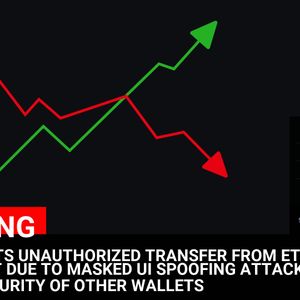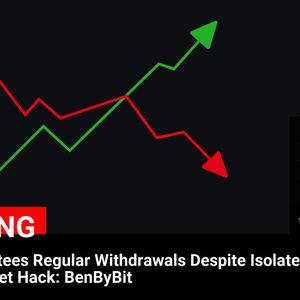The cryptocurrency world is buzzing, and not for the right reasons. A recent incident involving the LIBRA meme coin, touted by Argentina’s President, has sparked a serious debate. Marcin Kazmierczak, COO of Redstone, a prominent DeFi oracle project, is raising alarm bells. He believes this “rugpull” event isn’t just a minor setback; it’s a potential threat to the entire crypto sector. Let’s dive into why this incident is causing ripples and what it means for the future of crypto investments and DeFi regulation. Why is the LIBRA Rugpull a Red Flag for Crypto Investment? Kazmierczak argues that incidents like the LIBRA rugpull can have long-lasting negative consequences. Imagine hundreds of dedicated teams tirelessly building innovative crypto projects with real-world utility. Their efforts, aimed at revolutionizing finance and technology, risk being overshadowed by the quick-rich schemes and fraudulent coins that grab headlines. This is where the problem lies – the noise of scams can drown out the signal of genuine innovation. Here’s a breakdown of why this is a significant concern for crypto investment : Erosion of Trust: Rugpulls severely damage investor confidence. When people see high-profile incidents of projects vanishing with investors’ funds, it creates a climate of fear and skepticism. This makes it harder for legitimate projects to attract funding and user adoption. Capital Misallocation: As Kazmierczak points out, money spent on speculative gambling coins is money diverted from long-term, sustainable projects. This misallocation of capital hinders the growth and maturity of the broader crypto ecosystem. Reinforcing Negative Perceptions: Incidents like LIBRA reinforce the narrative that cryptocurrencies are simply high-risk gambles, lacking real value or purpose. This perception is particularly damaging when it comes to public opinion and, crucially, regulatory scrutiny. The Shadow of Crypto Scams: How Does it Impact DeFi Regulation? The rise of crypto scams , including rugpulls, is a major headache for the industry. While DeFi (Decentralized Finance) offers exciting possibilities for financial innovation, it also presents new avenues for malicious actors. The lack of traditional intermediaries in DeFi can, unfortunately, make it easier for scammers to operate, at least in the short term before robust on-chain monitoring and user education catches up. Consider these points regarding the impact of scams on DeFi regulation : Aspect Impact of Crypto Scams Regulatory Scrutiny Incidents like rugpulls increase pressure on regulators to step in and impose stricter rules on the crypto space. While some regulation is necessary for investor protection, overly burdensome rules can stifle innovation and push legitimate projects away. Public Perception Scams fuel public fear and distrust of cryptocurrencies. This negative perception can lead to slower adoption rates and resistance to the integration of crypto technologies into mainstream finance. Industry Reputation Frequent scams tarnish the reputation of the entire crypto industry. This makes it harder to attract talent, build partnerships, and gain mainstream acceptance. Understanding Cryptocurrency Risk: Beyond the Hype It’s crucial for anyone venturing into the world of crypto to understand cryptocurrency risk . The potential for high returns is often highlighted, but the inherent risks are equally important to acknowledge. Rugpulls are just one type of risk; others include market volatility, technological vulnerabilities, and regulatory uncertainty. Here are some key risks to be aware of: Rugpulls and Exit Scams: As seen with LIBRA, these involve developers abandoning a project after raising funds, leaving investors with worthless tokens. Market Volatility: Crypto markets are notoriously volatile. Prices can swing dramatically in short periods, leading to significant losses. Smart Contract Bugs: DeFi platforms rely on smart contracts, and vulnerabilities in these contracts can be exploited by hackers. Regulatory Changes: The regulatory landscape for cryptocurrencies is still evolving. Changes in regulations can impact the value and legality of crypto assets. Lack of Insurance: Unlike traditional financial institutions, many crypto platforms lack deposit insurance, meaning investors’ funds are not protected in case of platform failure or theft. Navigating DeFi Regulation: Finding the Right Balance The question isn’t whether there should be DeFi regulation , but rather what kind of regulation is most effective and beneficial. The goal should be to protect investors and prevent illicit activities without stifling innovation and the growth of the DeFi sector. Finding this balance is a complex challenge for regulators worldwide. Here are some key considerations for effective DeFi regulation: Clarity and Consistency: Regulations need to be clear, consistent, and predictable to provide a stable environment for businesses to operate. Risk-Based Approach: Regulation should be tailored to the specific risks associated with different DeFi activities. A one-size-fits-all approach may not be appropriate. International Cooperation: Given the global nature of crypto, international cooperation is essential to prevent regulatory arbitrage and ensure consistent standards. Innovation-Friendly Frameworks: Regulations should encourage innovation and allow the DeFi sector to continue to develop and evolve. Sandbox environments and regulatory sandboxes can be useful for testing new approaches. Investor Education: Alongside regulation, investor education is crucial. Empowering users with the knowledge to understand risks and make informed decisions is vital for long-term protection. Protecting Your Crypto Investment: Actionable Insights While the risks are real, the potential of crypto and DeFi remains significant. To navigate this landscape safely and responsibly, consider these actionable insights for protecting your crypto investment : Due Diligence is Key: Thoroughly research any crypto project before investing. Understand the team, technology, tokenomics, and community. Look for red flags like anonymous teams, unrealistic promises, and lack of transparency. Diversification: Don’t put all your eggs in one basket. Diversify your crypto portfolio across different projects and asset classes to mitigate risk. Security Practices: Use strong passwords, enable two-factor authentication, and store your crypto assets in secure wallets (preferably hardware wallets for larger holdings). Stay Informed: Keep up-to-date with the latest news, trends, and regulatory developments in the crypto space. Knowledge is your best defense against scams and bad investments. Risk Management: Only invest what you can afford to lose. Crypto investments are inherently risky, and you should be prepared for potential losses. Conclusion: Navigating the Crypto Landscape with Caution and Awareness The LIBRA rugpull incident serves as a stark reminder of the risks inherent in the cryptocurrency world. While the promise of innovation and financial freedom is compelling, it’s crucial to approach crypto investments with caution and awareness. Incidents of crypto scams like rugpulls can have far-reaching consequences, impacting investor trust, hindering the growth of legitimate projects, and prompting stricter DeFi regulation . By understanding cryptocurrency risk , practicing due diligence, and advocating for sensible DeFi regulation , we can work towards a more secure and sustainable future for the crypto sector. To learn more about the latest crypto market trends, explore our article on key developments shaping Bitcoin price action.



















